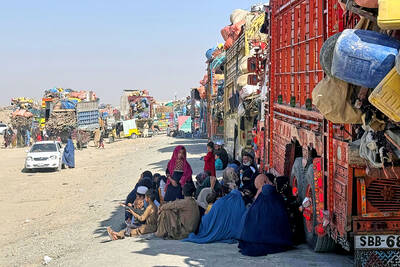Australian Prime Minister Kevin Rudd accused Wall Street of “obscene failures” in corporate governance yesterday and blamed “extreme capitalism” for the financial crisis that is gripping the world.
A day after announcing an urgent A$10.4 billion (US$7.4 billion) surge in spending to protect the Australia economy from recession, Rudd blamed the meltdown on failures in lending standards, risk management and corporate governance by the world’s major lending institutions.
“In fact, obscene failures in corporate governance which rewarded greed without any regard to the integrity of the financial system,” Rudd said in a speech to the National Press Club in Canberra.
“These failures weren’t limited just to businesses on the margins of the financial system. They happened in our major global financial institutions — the Wall Street investment banks that were the pillars of the global financial system,” he said.
He said the “absurdity and the obscenity” of lending practices in the subprime mortgage market gradually led to a complete collapse in confidence in the financial system.
“What we have seen is the comprehensive failure of extreme capitalism,” he said. “Extreme capitalism which now turns to government to prevent systemic failure.”
Rudd said the world was now wrestling with the “twin evils” of fear and greed. The huge government bailouts were aimed at dealing with the former, he said, and taking aim at huge salaries and payouts to executive would come later to deal with the latter.
Governments around the industrialized world have pumped billions of dollars into their financial sectors to bail out institutions, leading to charges that capitalism privatizes profits but socializes losses.
Governments should act so that greed and lax regulation were never allowed to put the world in the same position again, he said, adding that Australia would press for this at a meeting of the G20 group of 20 rich and emerging nations next month.
Rudd said Australia would push for new global rules that banned excessive pay for finance industry executives and linked bank capital requirements and good corporate behavior to executive salaries.
Global financial institutions need to have clear incentives to promote responsible behavior rather than unrestrained greed, he said, calling on the Basel II accord on banks’ capital adequacy to incorporate such requirements.
“Specifically ... regulators should set higher capital requirements for financial firms with executive remuneration packages that reward short-term returns or excessive risk-taking,” he said.
Rudd said his government would work with the Australian Prudential Regulatory Authority (APRA) to bring fat-cat pay packets under control.
“This is not just a question of fairness and perceived fairness in the system, it goes actually to the kernel of the incentive structures around risk-taking,” he said.
Canberra and the APRA will consider new policies that would “deal with the problem of executive remuneration” in financial institutions.
Rudd reiterated what has become his government’s mantra — Australia will not escape unscathed but its financial institutions are sound and the country is better placed than many to weather the storm.
One reason was that while countries such as China and India would be affected, emerging economies remained strong.
“Asia is the fastest-growing part of the global economy, by a long shot,” he said.
“Further, Chinese leaders have indicated a willingness to lower interest rates to stimulate their domestic economy — an important signal for the global economy, he said.

With much pomp and circumstance, Cairo is today to inaugurate the long-awaited Grand Egyptian Museum (GEM), widely presented as the crowning jewel on authorities’ efforts to overhaul the country’s vital tourism industry. With a panoramic view of the Giza pyramids plateau, the museum houses thousands of artifacts spanning more than 5,000 years of Egyptian antiquity at a whopping cost of more than US$1 billion. More than two decades in the making, the ultra-modern museum anticipates 5 million visitors annually, with never-before-seen relics on display. In the run-up to the grand opening, Egyptian media and official statements have hailed the “historic moment,” describing the

‘CHILD PORNOGRAPHY’: The doll on Shein’s Web site measure about 80cm in height, and it was holding a teddy bear in a photo published by a daily newspaper France’s anti-fraud unit on Saturday said it had reported Asian e-commerce giant Shein (希音) for selling what it described as “sex dolls with a childlike appearance.” The French Directorate General for Competition, Consumer Affairs and Fraud Control (DGCCRF) said in a statement that the “description and categorization” of the items on Shein’s Web site “make it difficult to doubt the child pornography nature of the content.” Shortly after the statement, Shein announced that the dolls in question had been withdrawn from its platform and that it had launched an internal inquiry. On its Web site, Le Parisien daily published a

‘NO WORKABLE SOLUTION’: An official said Pakistan engaged in the spirit of peace, but Kabul continued its ‘unabated support to terrorists opposed to Pakistan’ Pakistan yesterday said that negotiations for a lasting truce with Afghanistan had “failed to bring about a workable solution,” warning that it would take steps to protect its people. Pakistan and Afghanistan have been holding negotiations in Istanbul, Turkey, aimed at securing peace after the South Asian neighbors’ deadliest border clashes in years. The violence, which killed more than 70 people and wounded hundreds, erupted following explosions in Kabul on Oct. 9 that the Taliban authorities blamed on Pakistan. “Regrettably, the Afghan side gave no assurances, kept deviating from the core issue and resorted to blame game, deflection and ruses,” Pakistani Minister of

UNCERTAIN TOLLS: Images on social media showed small protests that escalated, with reports of police shooting live rounds as polling stations were targeted Tanzania yesterday was on lockdown with a communications blackout, a day after elections turned into violent chaos with unconfirmed reports of many dead. Tanzanian President Samia Suluhu Hassan had sought to solidify her position and silence criticism within her party in the virtually uncontested polls, with the main challengers either jailed or disqualified. In the run-up, rights groups condemned a “wave of terror” in the east African nation, which has seen a string of high-profile abductions that ramped up in the final days. A heavy security presence on Wednesday failed to deter hundreds protesting in economic hub Dar es Salaam and elsewhere, some